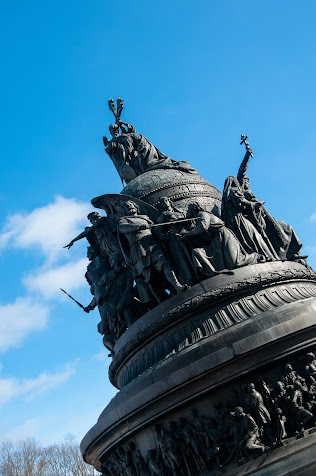RUSSIAN VISA FOR PAKISTAN AND INDIA
If you're planning a trip to Russia from Pakistan or India,
you'll need to obtain a visa before you can enter the country. The process of
obtaining a Russian visa can seem daunting, but with a little bit of
preparation and organization, it can be a relatively simple process.
First, you'll need to decide which type of visa you need. The most common types of
Russian visas are tourist, business, and work visas. Each type has its own set
of requirements and application process, so be sure to check the specific
requirements for the type of visa you need.
Once you've determined which type of visa you need, you'll need to gather the
necessary documents. These typically include a valid passport, passport-sized
photographs, a completed visa application form, and proof of travel arrangements
(such as a confirmed hotel reservation or a letter of invitation from a Russian
host).
After you've gathered all the necessary documents, you'll need to submit them to the
Russian Embassy or Consulate in Pakistan or India. You may be able to submit your
application in person, or you may need to do it by mail. Be sure to check the
specific procedures for the Russian Embassy or Consulate where you will be
applying.
The processing time for a Russian visa can vary depending on the type of visa and
the Embassy or Consulate where you apply, so be sure to plan accordingly. In
most cases, you can expect to receive your visa within a few weeks of
submitting your application.
In conclusion, obtaining a Russian visa from Pakistan or India can be a
straightforward process if you plan ahead, gather all the necessary documents,
and submit them to the correct Embassy or Consulate. With the right
preparation, you can be on your way to exploring the beauty and culture of
Russia in no time.
RUSSIAN VISA REQUIREMENTS FOR PAKISTANI AND INDIAN
The specific documents required for a Russian visa from Pakistan and India may vary depending on the type of visa you are applying for and the Embassy or Consulate where you will be applying. However, some common documents that are usually required include:
- A valid passport: Your passport must be valid for at least six months after the date you plan to leave Russia, and it should have at least two blank pages for the visa.
- Passport-sized photographs: You will typically need to submit two passport-sized photographs with your visa application. These photographs should be recent and taken against a plain background.
- A completed visa application form: You will need to fill out a visa application form, which can usually be found on the website of the Russian Embassy or Consulate where you will be applying.
- Proof of travel arrangements: You will need to provide proof of your travel arrangements, such as a confirmed hotel reservation or a letter of invitation from a Russian host. The letter of invitation can be obtained from a Russian tour agency or from the Russian host.
- Proof of financial means: You will need to provide proof that you have enough money to support yourself during your stay in Russia, such as bank statements or a letter from your employer confirming that you will be financially supported during your trip.
- Insurance: You will need to provide proof of valid medical insurance that will cover you during your stay in Russia.
- Other documents such as work or business visa would require additional documents such as company registration, business plan, invitation letter from the host company, etc.
It's important to note that the Russian Embassy or Consulate where you will be applying may have additional requirements and it's recommended to check the specific procedures on their website.
RUSSIAN VISA REQUIREMENTS FOR MINORS
If you're applying for a Russian visa for a minor (a child under the age of 18), there are a few additional documents that will be required, in addition to the standard visa application documents. These include:
- A birth certificate: A copy of the child's birth certificate will be required as proof of age and identity.
- A notarized parental consent: If the child is traveling with only one parent, or with a guardian, a notarized letter of consent from the other parent or legal guardian will be required.
- Photocopy of Parent's Passport: You should provide a photocopy of both the parents' passport
- Photocopy of Parent's CNIC: You should provide a photocopy of both the parents' National Identity Card (CNIC)
- A school certificate: If the child is still in school, a copy of the child's school certificate may be required as proof of enrollment and attendance.
- Other documents such as work or business visa would require additional documents such as company registration, business plan, invitation letter from the host company, etc.
It's important to note that the Russian Embassy or Consulate where you will be applying may have additional requirements, and it's recommended to check the specific procedures on their website.
Also, please note that minors traveling alone, or with only one parent, may be subject to additional scrutiny, and it's important to check with the Russian Embassy or Consulate before submitting the application.
RUSSIAN VISA FEE FOR PAKISTANI AND INDIAN
The cost of a Russian visa for citizens of Pakistan and India can vary depending on the type of visa, the duration of the visa, and the number of entries allowed. It also depends on the Embassy or Consulate where you will be applying.
Generally, the fees for a single entry, tourist visa for up to 30 days for Pakistan and India citizens are around $50-70 and for multi-entry visa for up to 90 days is around $100-120. For business visa, the fees are generally higher, around $150-200, and for work visa, the fees can be even higher depending on the duration and type of work.
It's important to note that the visa fee is non-refundable and in most cases, the payment should be made in cash or through bank transfer. The Embassy or Consulate may also accept credit cards or other forms of payment, but it's best to check with them before submitting your application.
It's also recommended to check the specific fees and procedures on the website of the Russian Embassy or Consulate where you will be applying, as the fees can change periodically and may vary from one location to another.
RUSSIAN VISA PROCESSING TIME
The processing time for a Russian visa can vary depending on the type of visa, the Embassy or Consulate where you are applying and the time of the year. In general, it takes around 10-15 working days to process a Russian visa application, but it can take longer or shorter depending on the specific circumstances.
For example, the processing time for a tourist visa can take around 10-15 working days, but for a business or work visa, it can take longer, up to 20-30 working days. Also, during the peak travel seasons, the processing time can be longer, as the Embassies and Consulates may experience a higher volume of applications.
It's important to note that the processing time mentioned above is the standard processing time, and the Embassy or Consulate may take longer or shorter time to process your application depending on the specific circumstances. Therefore, it's recommended to apply for your visa well in advance of your planned travel date to ensure that you have enough time to receive your visa.
It's also recommended to check the specific processing time and procedures on the website of the Russian Embassy or Consulate where you will be applying, as the processing time can change periodically and may vary from one location to another.
RUSSIAN VISA VALIDITY
The validity of a Russian visa refers to the period of time during which the visa is valid, and during which the holder of the visa is permitted to enter Russia. The validity of a Russian visa can vary depending on the type of visa and the duration of the intended stay.
For example, a single-entry tourist visa is typically valid for 30 days from the date of entry, and the holder of the visa is permitted to stay in Russia for up to 30 days. A multiple-entry tourist visa is generally valid for up to 3 months, 6 months or one year from the date of issue, and the holder of the visa is permitted to enter Russia as many times as they want during the validity period, but still, the stay is limited to 30 days per entry.
A business visa can be issued for a validity period of up to 1 year, and the holder of the visa is permitted to enter Russia multiple times during this period, but the duration of stay is limited to 90 days per each 180 days.
A work visa, on the other hand, is generally valid for the duration of the employment contract, up to 3 years, and the holder of the visa is permitted to enter and stay in Russia for the duration of the contract.
It's important to note that the visa validity period begins on the date of issue, not on the date of entry into Russia. Therefore, it's important to check the validity period of your visa before making travel plans and to make sure that your visa is still valid on the date you plan to enter Russia.
It's also recommended to check the specific visa validity and procedures on the website of the Russian Embassy or Consulate where you will be applying, as the rules can change periodically and may vary from one location to another.
RUSSIA PORT ENTRY REQUIREMENTS
When entering Russia, travelers are required to present certain documents at the port of entry, in order to be granted entry into the country. The requirements for entry into Russia vary depending on the purpose of the visit and the type of visa held by the traveler. However, some common documents that are usually required include:
- A valid passport: Your passport must be valid for at least six months after the date you plan to leave Russia, and it should have at least two blank pages for the visa.
- A valid visa: The traveler must hold a valid Russian visa, which must match the purpose of the visit and the type of visa issued.
- A migration card: All travelers entering Russia are required to fill out a migration card, which will be provided upon arrival. The migration card is used to register the traveler with the Russian authorities and must be kept with the passport at all times during the stay in Russia.
- Proof of financial means: Travelers may be required to provide proof that they have enough money to support themselves during their stay in Russia, such as bank statements or a letter from their employer confirming that they will be financially supported during their trip.
- Proof of travel arrangements: Travelers may be required to provide proof of their travel arrangements, such as a confirmed hotel reservation or a letter of invitation from a Russian host.
- Insurance: Travelers may be required to provide proof of valid medical insurance that will cover them during their stay in Russia.
- Other documents such as work or business visa would require additional documents such as company registration, business plan, invitation letter from the host company, etc.
It's important to note that the border officials have the discretion to ask for additional documents or information, so it's best to be prepared and have all your documents in order.
It's also recommended to check the specific entry requirements and procedures on the website of the Russian Embassy or Consulate where you will be applying, as the rules can change periodically and may vary from one location to another.
RUSSIAN VISA INVITATION LETTER FORMAT
A letter of invitation, also known as a visa support letter, is a document that is provided by a Russian host and is required for certain types of Russian visas, such as tourist and business visas. The letter of invitation serves as proof of the purpose of the trip and the arrangements that have been made for the traveler's stay in Russia.
The format of a Russian visa invitation letter can vary depending on the specific requirements of the Russian Embassy or Consulate where the traveler will be applying for the visa. However, a typical Russian visa invitation letter should include the following information:
- The full name and passport number of the traveler
- The purpose of the trip (tourism, business, etc.)
- The dates of the traveler's stay in Russia
- The address and contact information of the Russian host
- A statement confirming that the host will provide accommodation and financial support for the traveler during their stay in Russia
- The signature and passport details of the host
It's important to note that the Russian host should also provide a copy of their passport, a copy of their Russian residence permit (if applicable) and a copy of their Russian tax registration certificate (if applicable).
It's also recommended to check the specific format and procedures on the website of the Russian Embassy or Consulate where you will be applying, as the rules can change periodically and may vary from one location to another. Some Embassies/Consulates may require the letter to be legally attested by a notary or the Ministry of foreign affairs.
RUSSIA TOP TOUR PLACES
Russia is a vast country with a rich history and culture, and there are many tourist places to visit. Some of the top tourist places in Russia include:
- Moscow: The capital city of Russia is home to many historical and cultural landmarks, including the Kremlin, Red Square, St. Basil's Cathedral, and the Tretyakov Gallery.
- St. Petersburg: Often referred to as the "cultural capital" of Russia, St. Petersburg is home to many famous museums, palaces, and cathedrals, including the Hermitage Museum, the Peter and Paul Fortress, and the Church of the Savior on Spilled Blood.
- The Golden Ring: This is a group of ancient towns and cities located to the northeast of Moscow that are known for their historical and architectural significance. The towns of Suzdal, Vladimir, and Yaroslavl are all part of the Golden Ring and are popular tourist destinations.
- Lake Baikal: located in Russia's Siberia region, Lake Baikal is the oldest and deepest lake in the world and is known for its clear waters, unique flora and fauna, and spectacular scenery.
- Kazan: The capital of the Tatarstan region of Russia, Kazan is known for its mix of Tatar and Russian culture and its many historical and architectural landmarks, including the Kazan Kremlin and the Kul Sharif Mosque.
- The Trans-Siberian Railway: This famous railway runs from Moscow to Vladivostok and is a great way to see the vast and varied landscape of Russia.
- The Kamchatka Peninsula: located in the Far East, Kamchatka is known for its rugged natural beauty, including its many volcanoes and hot springs, as well as its wildlife, including bears, eagles, and salmon.
- The Altai Mountains: located in the southwestern part of Siberia, the Altai Mountains are a popular destination for hikers, skiers, and adventure travelers.
These are just a few examples of the many tourist places that Russia has to offer, and there is much more to explore and discover depending on your interest.









0 Comments